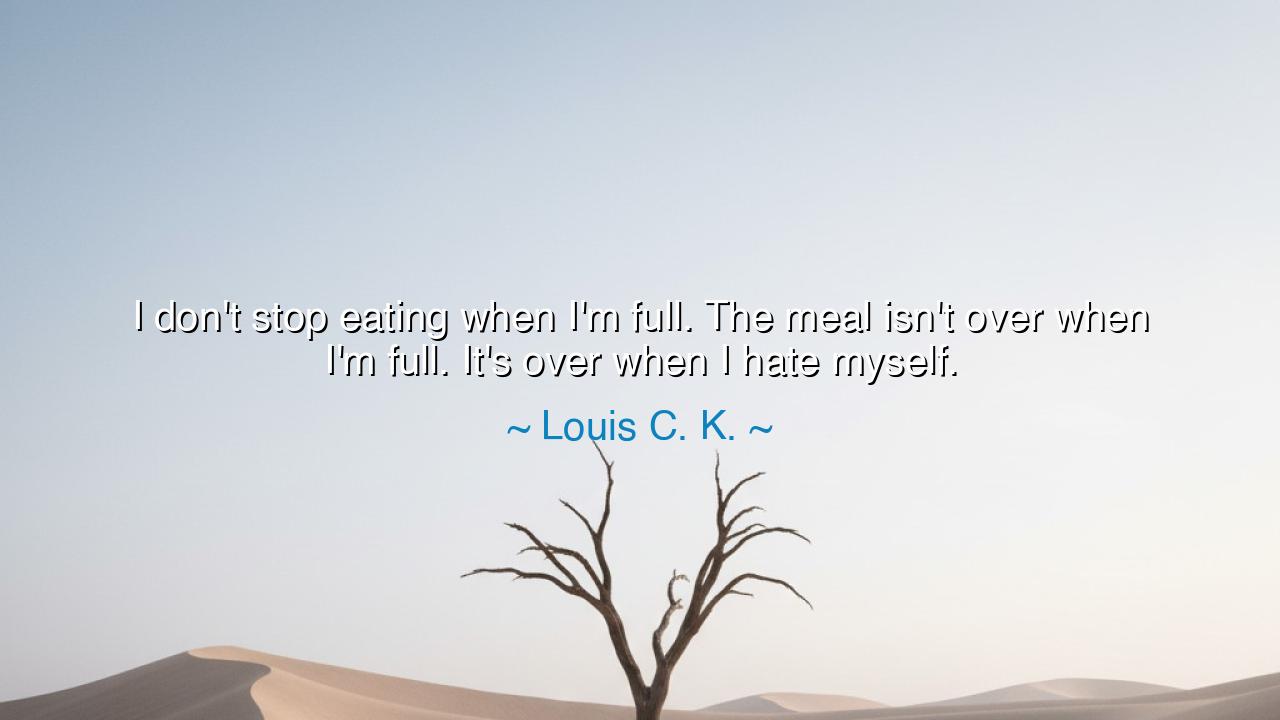
I don't stop eating when I'm full. The meal isn't over when I'm
I don't stop eating when I'm full. The meal isn't over when I'm full. It's over when I hate myself.






When Louis C.K. confessed, “I don’t stop eating when I’m full. The meal isn’t over when I’m full. It’s over when I hate myself,” he clothed tragedy in laughter. Beneath the humor lies a deep and haunting truth about the nature of excess, emptiness, and the human craving for comfort. It is a confession that belongs not just to one man, but to all of us — for every soul that has ever sought satisfaction outside itself has tasted this same bitter fullness. His words, though modern and comedic, echo the oldest wisdom of the ancients: that indulgence without awareness leads not to joy, but to sorrow disguised as pleasure.
In this quote, the act of overeating becomes a symbol of spiritual hunger — the endless attempt to fill the void of longing with more than the body or the heart can bear. To be “full” should be the moment of gratitude, of completion. Yet for Louis C.K., fullness is not the end, but the beginning of self-destruction. It is the place where appetite no longer serves the body, but begins to consume the spirit. His “meal” is not only a feast of food, but of desire, of emotion, of all the unchecked hungers that drive humanity to keep taking, long after enough has been reached. It is, in essence, the modern reflection of the ancient warning: when appetite becomes master, the soul becomes slave.
The ancients understood this tension well. The Greek philosopher Plato likened the undisciplined soul to a “leaky jar” — no matter how much it is filled, it is never satisfied, for it has lost its shape. Similarly, Louis C.K.’s confession reveals a man aware of his own leaky vessel. The more he fills it, the emptier he becomes. The “hate” he feels at the end of his meal is not hatred of food, but of weakness — the pain of knowing that pleasure has triumphed over reason. His humor, biting and self-aware, becomes a lament in disguise, a warning that gluttony of any kind is the slow undoing of the self.
There is an ancient parallel in the story of Emperor Claudius, who was said to host extravagant banquets that lasted through the night. Surrounded by dishes of unimaginable luxury, he ate beyond measure, driven by a compulsion he could not name. When the body grew weary of pleasure, he turned to wine, and when the spirit rebelled, he sought more novelty. Yet at the height of his indulgence, his advisors wrote that he often fell into silence, staring at the table before him as though haunted. The empire’s ruler was enslaved by his cravings, and the grandest table in Rome had become a throne of misery. So too, Louis C.K., with humor as his mask, reveals the same captivity — the moment when pleasure ceases to please.
But this quote is not only about food — it is a mirror held to every excess in human life. We work until exhaustion, buy until we are broke, love until we are hollow, and chase distraction until we despise ourselves. The cycle is the same: we pursue what promises comfort, only to find discomfort multiplied. The self-hatred that Louis C.K. names is the recognition that excess cannot heal emptiness — it only deepens it. True satisfaction, as the wise have always known, comes not from abundance, but from awareness, balance, and gratitude.
Yet within this darkness lies a flicker of redemption: the ability to laugh at one’s own folly. Humor, in this context, becomes both shield and sword — a way to acknowledge our brokenness without being destroyed by it. The ancients, too, understood the healing power of laughter. Diogenes, the Cynic philosopher, mocked human vanity and greed by parodying it; in his laughter, he sought to awaken others from illusion. Louis C.K., in a modern echo of that tradition, uses laughter to expose truth. His jest is not cruelty, but confession — an invitation for all of us to see ourselves in his weakness and, perhaps, to awaken.
Thus, the lesson of Louis C.K.’s words is not merely about appetite, but about self-awareness and restraint. To live well is to recognize the line between pleasure and punishment, between fulfillment and emptiness. The wise do not reject pleasure, but they know when to stop — when the heart is satisfied and gratitude begins. The fool, mistaking consumption for contentment, eats until he is sick, loves until he is wounded, and chases joy until he despises it.
So, dear listener, take this teaching to heart: stop before the hate begins. Leave the table — of food, of desire, of ambition — while your heart is still grateful. For no one, in the quiet hour of reflection, ever repents of having stopped too soon, but many have wept for having gone too far. The feast of life is meant to nourish, not destroy. Eat with joy, but live with wisdom — and let your fullness be peace, not regret.






AAdministratorAdministrator
Welcome, honored guests. Please leave a comment, we will respond soon